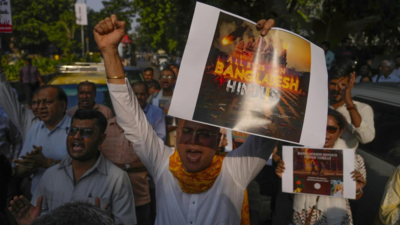
NEW DELHI: A top aide to Bangladesh’s interim government’s chief adviser, Muhammad Yunus dismissed speculation about the ban. International Society for Krishna Consciousness (Iskcon), following the controversial arrest of a monk associated with a Hindu organization.
Press Secretary Shafiqul Alam, speaking to ANI, categorically stated that there is no plan to ban Iskcon, reiterating the government’s position: “We have repeatedly said, there is no plan to ban Iskcon.”
This statement comes amid growing unrest in Bangladesh following the November 25 arrest of Chinmoy Krishna Das, a spiritual leader associated with Sammilita Sanatani Jagaran Jote, who faces charges of sedition, including charges of disrespecting the national flag during a Hindu rally in Dhaka. .
In the midst of political turmoil, Alam signaled that Yunus would call for national unity, with the aim of combating misinformation and vested interests that threaten the country’s stability. “I think we are at an important stage. The Chief Counsel will call on all political parties for national unity – unity against misinformation and against those who are trying to destroy the country,” said Alam.
Call for unity in the midst of political challenges
Yunus on Tuesday reportedly met with leaders of various political parties. Asaduzzaman Fuaad, Secretary General of the Bangladesh Amar Party, said that the political party supports Yunus’ call for national unity. “Several political parties have asked Prof. Yunus to take steps to hold elections as soon as possible after implementing the necessary reforms,” Fuaad told reporters.
Meanwhile, Alam accused former Prime Minister Sheikh Hasina of overseeing widespread human rights abuses during her tenure, describing her as a “mass murderer.” “He has overseen one of the most brutal dictatorships. Under his watch, thousands have died, thousands have disappeared, and millions have faced false accusations,” Alam said.
Hasina, ousted earlier this year after mass protests, has recently criticized the interim government for persecuting her party, the Awami League, and its leadership. “The present regime, which seized power illegally, has failed in every sector,” Hasina said, condemning the arrest of Chinmoy Krishna Das and attacks on minority communities.
Court petition seeks ban on Indian TV channels
In a related development, a writ petition filed in the Bangladesh high court has sought a ban on Indian TV channels. Lawyer Ekhlas Uddin Bhuiyan cited the Cable Television Network Operations Act of 2006, supporting the ban on the broadcast. Alam declined to comment on the matter, citing “court issues” while stressing the government’s commitment to media freedom.
An interim government, led by Nobel laureate Muhammad Yunus, came to power after mass protests forced Hasina to resign. The government faces increasing challenges, including political unrest and concerns about the security of minorities.
Yunus’ adviser asks India to recognize ‘July-Agus rebellion’
A senior aide of Bangladesh’s interim government also called on India to “unreservedly” recognize the July-August uprising, which led to the ouster of Prime Minister Sheikh Hasina.
Mahfuj Alam, the main leader of the Student Anti-Discrimination Movement, made the appeal in a Facebook post on Wednesday. Alam urged India to reconsider its perception of the insurgency, which it claimed had been misrepresented as “militant, anti-Hindu, and an Islamic takeover.”
Alam, who is considered a de facto minister in the interim government, stressed that understanding the July uprising was important to reset bilateral relations between the two countries. “Through the July uprising, the foundation of a new Bangladesh will destroy the relationship between the two countries,” Alam wrote. He urged India to recognize the reality of Bangladesh today, moving away from the outdated views since the 1975 military coup.
The July-August uprising, sparked by protests against the controversial job quota system, ended Hasina’s five-term government. After Hasina left for India on August 5, Nobel laureate Yunus served as the Chief Advisor to the interim government. Alam rejected comparisons to the 1975 coup, which overthrew Bangladesh’s founding leader Sheikh Mujibur Rahman, calling the July uprising a “democratic, generational, and responsible struggle.”
Dhaka-Delhi relations are strained amid tensions
Alam’s statement comes as relations between Bangladesh and India continue to strain, especially after the arrest of Hindu monk Chinmoy Krishna Das. Bangladesh dismissed Indian concerns about the vulnerability of the country’s Hindu community, raising diplomatic tensions.
Alam, who was introduced by former US president Bill Clinton as “the mastermind behind the whole revolution,” condemned India’s portrayal of the uprising. “India needs to change its Post ’75 playbook and recognize the new reality of Bangladesh,” he wrote. The statement suggests that India’s propaganda against the insurgency has failed, and that Bangladesh’s current struggle represents a more democratic movement.
As Bangladesh faces a political crisis, Alam warns that any attempt to ignore the importance of the July-August uprising will have long-term consequences for the country’s relations with India.

